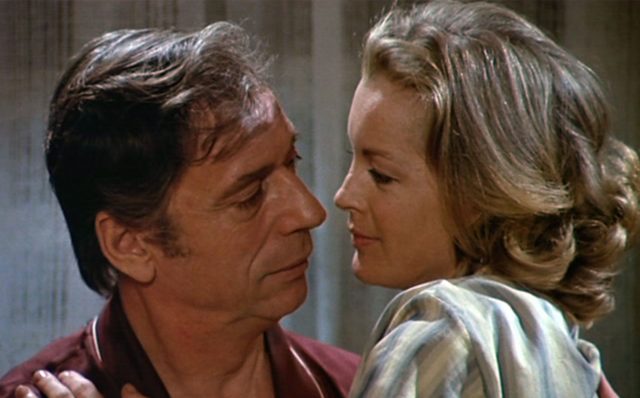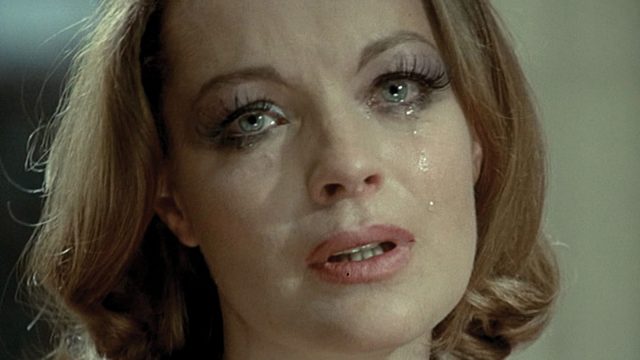3 Films Starring Romy Schneider: Romy at the Top, by David Bax

Austrian-born Romy Schneider made her mark as a child actor in the 1950s, playing a young royal in a popular film series. As she transitioned into adulthood, in the way of other teen sensations (more recent examples include the leads of the Twilight series), she sought out more daring, complex and, often, sexually charged roles in the films of notable auteurs (Visconti, Welles and Preminger, among others). Now, thanks to Film Movement’s “virtual cinema,” you can stream restored versions of three of her French films from the 1970s, starting chronologically with Claude Sautet’s The Things of Life (1970), in which she co-stars with the recently departed Michel Piccoli. The two had also appeared together in 1966’s La voleuse, which makes this Romy and Michel’s cinematic reunion.
The Things of Life begins in media res, in the immediate aftermath of a car accident that has left Piccoli’s Pierre drifting in and out of consciousness on the side of the road. In these elongated spaces between life and possible death, Pierre reflects on recent events with the people closest to him, from his ex-wife (L’Avventura‘s Lea Massari) to his son (Gérard Lartigau)–a mechanical science enthusiast who makes fake bird noise machines that sound eerily like the siren of the ambulance on its way to Pierre’s aid–to his mistress, Hélène (Schneider). Schneider’s role is mostly that of an object of affection and desire but she gets her moment at the film’s quietly emotional conclusion. On the way there, though, there’s plenty to enjoy, not least of which the multiple tense car scenes (the flashback structure of the movie is such that every time Pierre gets behind the wheel, you fear it may be the day of the accident) and the impressive stunt driving.

The Things of Life was Schneider’s first of five films Schneider would make with Sautet. In the third, César and Rosalie, she is once again the subject of an older, richer man’s affections. César (Yves Montand) even has a vehicular mishap of his own, being run off the road by young, hip, starving artist David (Band of Outsiders‘ Sami Frey). In this case, though, it’s much funnier, complete with a score that sounds like a Get Smart episode, highlighting the ridiculousness of the pompous César plowing his flashy car through the tall grass. Schneider’s role is more substantial this time around (the same can’t be said for the teenage Isabelle Huppert who shows up as an au pair in the final act). Instead of being one of two women between whom a man is trying to choose, Rosalie is the one given a choice between the impossibly wealthy César and the impossibly cool David. The joke is that César and Dvaid’s oafish quarrels manage to make both of them look less appealing, even as the men being to discover a bond of their own, putting César and Rosalie in the same company as another French comedy, Bertrand Blier’s Get Out Your Handkerchiefs.
César and Rosalie is a delightful watch all around. David and his friends’ art is pretty bitchin’, of-the-moment stuff. Piccoli makes an unseen return as the narrator. And we even get a scene of the same aquatic jousting sport seen in Agnès Varda’s La Pointe Courte.

Easily the best of Film Movement trilogy of restorations–not just as a movie but as a showcase for Schneider’s talents–is Andrzej Zulawski’s L’important c’est d’aimer (roughly, The Important Thing Is to Love). Schneider plays Nadine, a once respectable actress now relegated to starring in trashy erotica movies of which she’s ashamed. When a bottom-dwelling paparazzo, Servais (Fabio Testi), becomes infatuated with her–seriously, men are just always falling in love with Romy Schneider–he pulls some underworld strings to finance a play with a leading role for Nadine.
It’s both Schneider’s most layered performance of the three discussed here and her most overtly sexual; an early scene in which she poses for Servais’ camera showcases her stunning awareness and control of her eyes, hair and body. L’important c’est d’aimer is no free-spirited romp, though. Accompanied by an insistent, sinister score, its depiction of bohemian excess and depravity in the arts community betrays a conservative streak not unlike that found in slasher flicks. That’s not a complaint, however; those movies are often a blast. And this one’s got Klaus Kinski to boot!


























